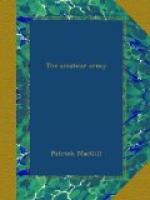Since then my fellow-soldiers and I have had almost unlimited rifle practice, on miniature and open ranges, at bull and disappearing targets, in field firing at distances from 100 to 600 yards. On a field exceeding 600 yards it is almost impossible to hit a point the size of an ordinary bull; fire then must be directed towards a position. Field or volley firing is very interesting. Once my company took train to Dunstable and advanced on an imaginary enemy that occupied the wastes of the Chiltern Hills. Practice commenced by firing at little squares of iron standing upright in a row about 200 yards off in front of our line. These represented heads and shoulders of men rising over the trenches to take aim at us as we advanced. In extended order we came to our position, 200 yards distant from the front trenches. At the sound of the officer’s whistle, we sank to the ground, facing our front, fixed our sights, and loaded. A second whistle was blown; we fired “three rounds rapid” at the foe. The aiming was very accurate; little spurts of earth danced up and around the targets, and every iron disc fell. The “searching ground,” the locality struck by bullets, scarcely measured a dozen paces from front to rear, thus showing that there was very little erratic firing.
“That’s some shooting!” my Jersey friend remarked. “If the discs were Germans!”
“They might shoot back,” someone said, “and then we mightn’t take as cool an aim.”
We are trained to the rifle; it is always with us, on parade, on march, on bivouac, and recently, when going through a dental examination, we carried our weapons of war into the medical officer’s room. As befits units of a rifle regiment, we have got accustomed to our gun, and now, as fully trained men, we have established the necessary unity between hand and eye, and can load and unload our weapon with butt-plate stiff to shoulder and eye steady on target while the operation is in progress. In fact, our rifle comes to hand as easy as a walking-stick. We shall be sorry to lose it when the war is over, and no doubt we shall feel lonely without it.
CHAPTER V
THE COFFEE-SHOP AND WANKIN
What the pump is to the villager, so the coffee-shop is to the soldier of the New Army. Here the men crowd nightly and live over again the incidents of the day. Our particular coffee-shop is situated in our corner of the town; our men patronise it; there are three assistants, plump, merry girls, and three of our men have fallen in love with them; in short, it is our very own restaurant, opened when we came here, and adapted to our needs; the waitresses wear our hat-badges, sing our songs, and make us welcome when we cross the door to take up our usual chairs and yarn over the cosy tables. The Jersey youth with the blue eyes, the Oxford man, who speaks of things that humble waitresses do not understand, the company drummer, the platoon sergeants, and the Cockney who vows that water is spoilt in making every cup of coffee he drinks, all come here, and all love the place.




